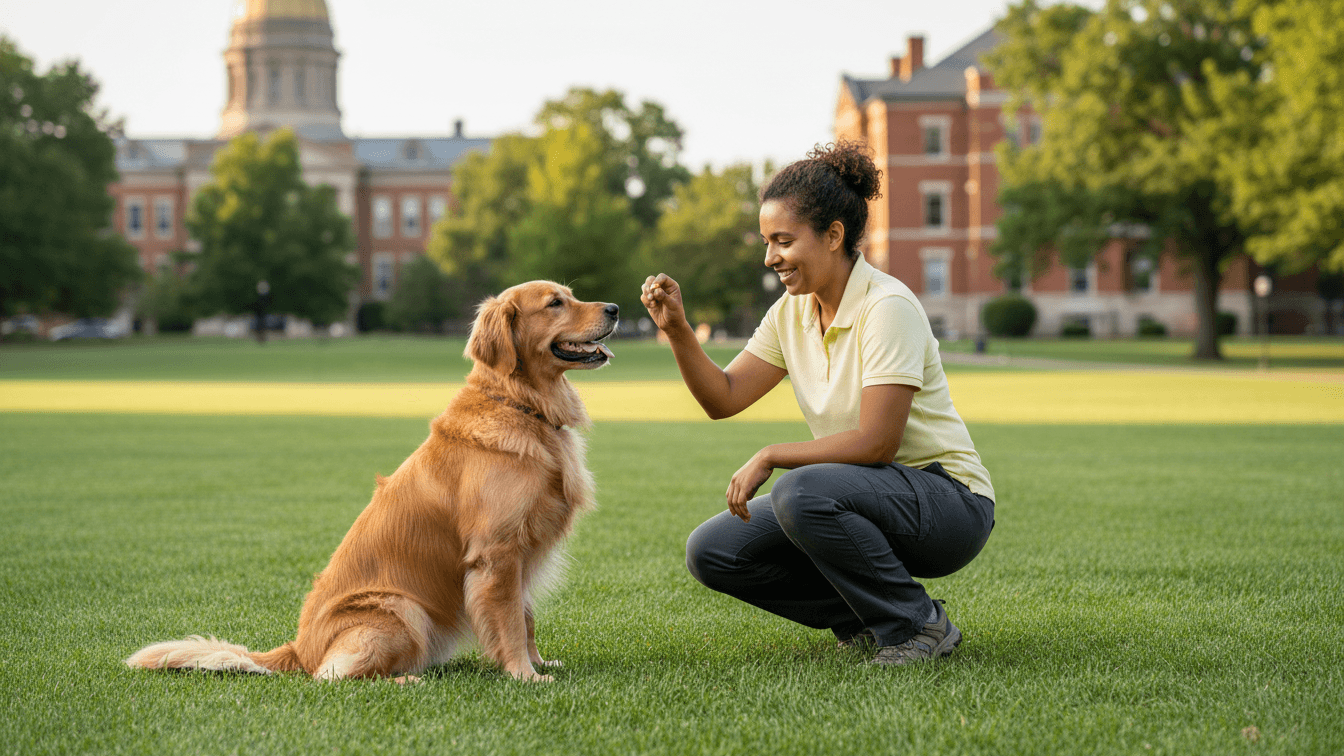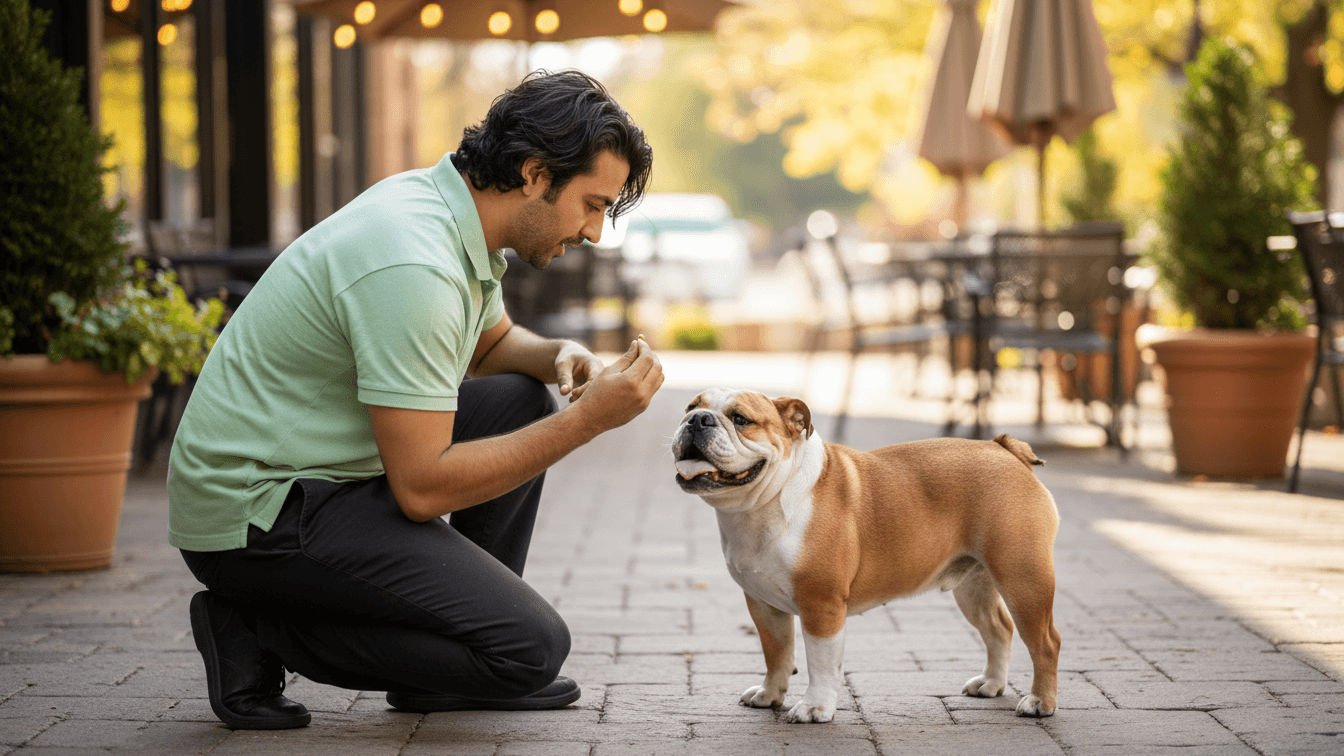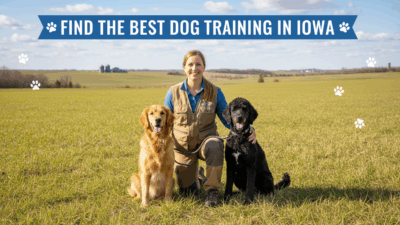Your Complete Guide to Choosing a Dog Trainer in Iowa
Finding the right professional dog trainer in Iowa means looking for someone who understands the unique challenges of life in the Hawkeye State. Whether you’re navigating crowded Des Moines farmers markets with your puppy, managing leash reactivity during Ragbrai events, or working on recall near busy Iowa State Fair crowds, your dog needs training that fits real Iowa life.
Iowa’s mix of urban centers, college towns, and rural communities creates distinct training needs. A dog in Cedar Rapids faces different daily challenges than one living near the Mississippi River bluffs in Dubuque or walking the trails around Iowa City.
How to Choose the Right Trainer
Start by identifying what you actually need to work on. Is your puppy jumping on visitors at the front door? Does your adult dog pull toward other dogs on walks through your local park? Are you dealing with separation anxiety when you leave for work?
Look for trainers who use positive reinforcement training methods and can demonstrate how they’ll help your dog succeed in Iowa-specific situations. That might mean calm greetings during tailgating season, polite behavior at outdoor concerts, or staying focused when pheasants flush from cornfield edges.
Credentials help you evaluate a trainer’s background and commitment to their profession. Common dog trainer certifications include CPDT-KA, KPA-CTP, and IAABC-CDBC for serious behavior issues. If you’re dealing with aggression or extreme fear, ask whether your trainer holds a CBCC-KA credential or has completed an advanced program like CTC.
In-home dog training works especially well for door manners, house training, and building good habits in your actual living space. Group classes make sense once your dog can handle distractions, which helps prepare for community events and busy public spaces.
Private lessons give you flexibility to work on specific problems and customize your training program around your schedule. Board and train programs can accelerate progress when you need faster results or lack time for daily practice.
Common Dog Training Methods Explained

Reward-based methods create the kind of reliable, happy obedience that holds up whether you’re at a crowded city park or walking gravel roads in rural Iowa. These methods also keep you on the right side of local animal control expectations about keeping dogs under control.
Basic obedience covers the foundation skills every dog needs: sit, down, stay, come when called, loose-leash walking, and place training. These skills matter when you’re trying to enjoy restaurant patios, visit friends with kids, or navigate sidewalk festivals without drama.
Puppy training focuses on socialization during those critical early months. Good puppy classes teach bite inhibition, crate training, potty training basics, and how to handle new experiences calmly. Starting early prevents problems from taking root in the first place.
Behavior modification addresses fear, aggression, reactivity, resource guarding, and separation anxiety through systematic desensitization and counterconditioning. Complex cases often require collaboration between your trainer and your veterinarian, especially if medication might help your dog learn.
Dog training classes give your dog practice around other dogs and people in a controlled setting. The best group classes screen participants carefully, give dogs plenty of space, and focus on calm, focused behavior rather than just excitement and play.
Specialized programs like service dog training and therapy dog training require higher standards, more public-access work, and extremely clear training criteria. Not every trainer offers these programs, so ask about experience and success rates.
Avoid trainers who rely on fear, pain, or intimidation to get results. Those methods damage the trust between you and your dog, often create new behavior problems, and can put you at odds with Iowa’s animal welfare expectations.
Average Cost of Dog Training in Iowa (Updated for 2025)
Training costs across Iowa vary based on population density, trainer experience, and program length. Urban areas like Des Moines and Iowa City typically run higher than smaller communities, but you’ll find options at every price point.
| Service Type | Average Cost (Iowa) |
|---|---|
| Puppy classes (4-6 weeks) | $120-$250 total |
| Group obedience classes (4-6 weeks) | $140-$280 total |
| Private lessons (60-90 min) | $90-$175 per session |
| In-home training packages (4-6 visits) | $380-$850 total |
| Day training (per week) | $400-$900 |
| Behavior consultation (initial) | $125-$225 |
| Board and train (2-4 weeks) | $1,800-$4,200 total |
Expect to pay travel fees if you live outside a trainer’s primary service area. Behavior modification for aggression or severe anxiety usually costs more because of the expertise and time required.
Make sure you understand what each package includes, how progress gets measured, and whether follow-up support is part of the price. Many trainers offer a free consultation or free evaluation so you can meet before committing to a full program.
Questions to Ask a Potential Dog Trainer
- What training methods do you use, and how do you handle dogs who are scared or frustrated during training sessions?
- What certifications or credentials do you hold, and do you pursue continuing education like CPDT-KSA?
- Can you customize a training program for my dog’s specific issues and our Iowa lifestyle?
- Do you offer in-home visits, group classes, or day training, and which format fits my goals?
- How will we track my dog’s progress and know when we’re ready for more challenging environments?
- What are the total costs including any travel fees, and what’s your cancellation policy?
- Do you carry liability insurance, and can I see proof of coverage?
- For behavior problems, will you coordinate with my veterinarian if needed?
- What homework will I need to do between sessions to help my dog improve?
Local Iowa Rules and Considerations
Iowa state law and local city ordinances work together to set expectations for responsible dog ownership. Most cities enforce leash laws, vaccination requirements, and nuisance rules to keep neighborhoods safe and peaceful.
Leash laws vary by city, but most Iowa communities require leashes in all public spaces except designated off-leash dog parks. Check your city’s municipal code for specific requirements, especially if you plan to practice training in public parks or on trails.
Iowa Code Section 351 requires all dogs over six months old to be vaccinated against rabies and to wear a current rabies tag. You can find vaccination clinics through county public health departments or your regular veterinarian.
Barking ordinances exist in most Iowa cities to prevent noise complaints from neighbors. If your dog has separation anxiety or alert barking issues, work with your trainer before someone files a complaint with animal control.
Dog trainers in Iowa don’t need state licenses or special certifications to operate, but reputable professionals carry liability insurance and follow business regulations. If a trainer offers board and train services, their facility may need to meet local kennel or boarding standards depending on city rules.
Some cities require commercial dog training businesses to obtain permits before using public parks or facilities for training sessions. Your trainer should handle these requirements, but it’s worth asking about insurance and permits if you’re meeting in public spaces.
Local Iowa Resources for Dog Owners
These locations give you safe, legal places to practice training skills, work on socialization, and provide enrichment for your dog. Always follow posted rules and practice good dog park etiquette.
- Gray’s Lake Park in Des Moines offers a fenced dog park with separate areas for large and small dogs, plus paved trails around the lake for leash training practice
- Terry Trueblood Recreation Area Dog Park in Iowa City provides fenced space near the lake with beautiful views and room to practice recalls
- Cedar Valley Nature Trail welcomes leashed dogs along its 52-mile route between Waterloo and Hiawatha, giving you plenty of space to work on loose-leash walking and focus
- Yellow River State Forest in Northeast Iowa allows leashed dogs on trails and near campsites, perfect for building skills around wildlife and outdoor distractions

FAQs
How much does in-home dog training cost?
Most Iowa trainers charge $90-$175 per in-home visit, with lower rates in rural areas and higher rates in cities like Des Moines or Iowa City. Package deals usually bring the per-session cost down.
Is in-home dog training worth it?
Absolutely, especially when you’re dealing with problems that happen at home. Your trainer can address door manners, jumping on guests, house training accidents, and crate training right where the behaviors occur, then step outside to work on leash skills in your actual neighborhood.
Can you pay someone to house train your dog?
Yes, many trainers include potty training in their puppy programs or offer day training where they work with your dog during the day and teach you how to maintain the progress. This speeds up the process and helps you avoid common mistakes.
What is the 3-3-3 rule for dog training?
This guideline helps set realistic expectations for newly adopted dogs: about 3 days to decompress from the transition, 3 weeks to learn your routines and household rules, and 3 months to feel fully comfortable in your home. Good training programs work with this natural adjustment period rather than rushing it.
How long will it take to reach my training goals?
Most puppies and friendly adult dogs show noticeable progress in 4-8 weeks with consistent daily practice. Complex behavior problems like fear, aggression, or severe reactivity typically require several months of careful work with gradual increases in difficulty.
What should I bring to group classes?
Pack a flat collar or harness, a standard 6-foot leash, high-value treats your dog loves, water, poop bags, and current vaccination records if your trainer requires them. Leave retractable leashes at home because they make it harder to maintain control in group settings.
What’s the leash law in Iowa?
Leash laws vary by city across Iowa. Most communities require dogs to be leashed and under control in public spaces, with off-leash activity only allowed in designated dog parks. Check your city’s municipal code or animal control ordinances for specific rules in your area.
Do I need a dog license in Iowa?
Some Iowa cities require annual dog licenses while others don’t. Contact your city clerk’s office or animal control department to find out local requirements. Regardless of licensing rules, Iowa law requires current rabies vaccination and a visible rabies tag for all dogs over six months old.
What shots does my dog need in Iowa?
Iowa law requires rabies vaccination for all dogs over six months old. Your veterinarian will likely also recommend distemper-parvo combination vaccines and bordetella (kennel cough) depending on your dog’s lifestyle and exposure to other dogs.
Are dog trainers required to be licensed in Iowa?
Iowa doesn’t require special licenses or certifications for dog trainers. Trainers follow normal business regulations, but certified dog trainers voluntarily pursue credentials through national organizations to demonstrate their expertise and commitment to humane, science-based methods.
Where can I practice off-leash recall?
Use fenced dog parks in your area to keep practice sessions safe and legal. Many Iowa cities have designated off-leash areas where you can work on recalls without worrying about your dog running into traffic or bothering other park users.
Which dog parks allow training around Iowa?
Most Iowa dog parks welcome training as long as you’re not disrupting other visitors or running a commercial training session without proper permits. Popular options include Gray’s Lake Dog Park in Des Moines, Terry Trueblood Dog Park in Iowa City, and the Cedar Rapids Dog Park at Seminole Valley Park.
What trails allow dogs for training?
Iowa's state parks and forests generally allow leashed dogs on trails, making them great for practicing focus and loose-leash walking. Popular options include Ledges State Park near Boone, Backbone State Park in Delaware County, and Lacey-Keosauqua State Park in Southeast Iowa. Always check current park rules before visiting.
How do I find expert dog trainers near me?
Look for trainers who list specific credentials, explain their methods clearly, offer a free consultation to discuss your needs, and can provide references from past clients. Professional dog trainers should be willing to answer questions about their experience and show you how they’ll help your dog succeed.
What if my dog has aggressive behavior?
Aggressive dog training requires specialized expertise in behavior modification. Look for trainers with credentials like IAABC-CDBC or CBCC-KA who understand how to safely address fear-based aggression, resource guarding, or dog-to-dog aggression. Many cases benefit from coordination between your trainer and a veterinary behaviorist.
The right training for dogs in Iowa combines humane methods, consistent practice, and realistic goals that fit your actual daily life. Whether you’re raising a puppy in a Des Moines neighborhood or helping a reactive adult dog learn to stay calm on Ames sidewalks, working with a knowledgeable trainer who uses positive reinforcement will help your dog become the well-behaved companion you want.
